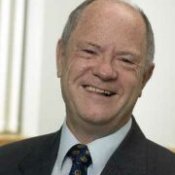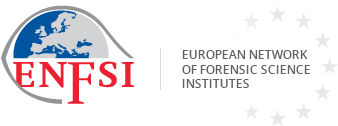The ENFSI membership has recognised the contributions of Bob Bramley and marked his stepping dow
n by honouring him with the Distinguished ENFSI Contributor Award in 2003.
Biography
Dr. Robert Keith Bramley (born 13-01-1944) started his working life as a 16 years old boy in the coal industry as a quality control chemist. He gained a bachelor’s degree in chemistry (1966) and a doctorate in organic reaction mechanisms (1969) from the University of Nottingham. Following a further year of academic research at University College, Cardiff, he then joined the Home Office North-Eastern Forensic Science Laboratory in Harrogate in 1970.
From 1970-73 he specialised in the laboratory examination of contact traces (paint, glass, marks, etc.) in offences against property and traffic accidents, fire investigation and alcohol analysis. He also carried out work at scenes of crime and gave evidence as an expert witness in court.
In 1973 he was made Head of Chemistry at the West Midlands Forensic Science Laboratory, Birmingham. This provided him with his first experience of management, but he continued to do casework as well. He extended his area of interest to include the analysis of explosives (in relation to the IRA bombing campaign in the UK), tachograph charts and metallurgical failures, and the provision of a wide range of analytical services (emission spectrography, IR, UV, SEM/MPA, XRD, GC, MS, fluorimetry, etc.).
In 1985, he was appointed Assistant Director. In this role he was responsible for the standards of professional performance of all four divisions of the laboratory: chemistry, biology, drugs/toxicology and document examination; and he set up the laboratory’s first fingerprint enhancement facility. Along with fellow Assistant Directors he was also responsible for carrying out quality assurance audits of other laboratories in what by then had become the Forensic Science Service.
In 1989, Bob was seconded as the senior scientific representative on a joint Home Office/Association of Chief Police Officers review of scientific support for the police. The recommendations of this review led to wide ranging changes in the way that scientific support is provided and managed.
From 1989-92, Bob was Head of Management Services/Business Manager at the Birmingham laboratory, overseeing its finance, procurement, IT, security, health and safety and personnel activities. He was also involved in the laboratory’s preparation for accreditation to the NAMAS M10 standard (now ISO 17025).
In 1992-93, he moved to FSS headquarters in London as Head of Personnel Policy. During this time he was tasked with the development and implementation of new staff performance appraisal and pay and grading arrangements, which are only now being overhauled.
In 1993, Bob moved back to Birmingham as the Regional Operations Manager, overseeing the output of all casework services from the laboratory. In 1995, this involved him in the establishment and management of the first laboratory for analysis of samples for the newly created National DNA Database.
Bob was appointed to his current position as Chief Scientist of the FSS in 1996. The Chief Scientist’s role is to provide assurance to the FSS Chief Executive that the professional work of the FSS is being carried out to an appropriate standard and to investigate any potential for miscarriage of justice. Bob provides the assurance by ensuring that all processes and procedures have been scientifically validated and comply with the requirements of the criminal justice system, and by monitoring performance against the standards by means of casework audits and quality assurance trials.
As Chief Scientist Bob also acts as Custodian of the National DNA Database under a Memorandum of Understanding with the Association of Chief Police Officers. This is a regulatory position that involves him in setting standards and monitoring performance against these for all laboratories in the UK, both public and private sector, who provide DNA analysis services for the National DNA Database.
Since he took up the role of Chief Scientist Bob has made an increasing contribution to the development of standards and quality assurance in forensic science, both in the UK and internationally. For example, as:
- Chairman of UN Drugs Control Programme Standing Panel for the International QA/International Collaborative Exercises Programme
- Chairman of ENFSI Standing Committee on Quality and Competence (previously QA Working Group)
- Member of SWGDRUG Core Committee and Chairman of its Ethics, Competence and Certification Sub-Committee
- Chairman of Science, Engineering and Manufacturing Technologies (SEMTA) Skills Council Forensic Science Sector Committee
- Member of the Executive Board/Council of the Registration Council for Forensic Practitioners
- Member of Council of the Police Sector Skills Organisation
- Member of the UKAS Chemical Technical Advisory Committee
- Member of the Open University Occupational Standards Board
Through these groups he has contributed to the development of many best practice guidance documents (e.g. on ethics, competence, validation, calibration, sampling, collaborative exercises, etc.). Bob has also made presentations and published on such issues and on the use of DNA and the National DNA Database to forensic scientists throughout Europe, the USA and further afield.
Focusing on Bob’s relation to ENFSI we can conclude that he has made a remarkable contribution to the success of ENFSI. Bob was a co-opted member of Board of the Quality Assurance Working Group since the start in 1997 and took over as chairman in March 1998. When the organisation of ENFSI was changed Bob was the natural choice as chairman of the Standing Committee for Quality and Competence (QCC).
During his period of office QALG/QCC have been very productive and successful, which to a great extent was due to Bob’s knowledgeable and efficient chairmanship, his organisational qualities and his never failing enthusiasm for Quality and Competence matters. They produced the ENFSI Quality Policy statement, which committed all Members to have or be working towards accreditation to the international quality standard ISO 17025, or equivalent, and they made a significant input to the development of the ILAC Guidelines that interpret this standard specifically for forensic science laboratories. Currently, a baseline survey of ENFSI Members is also being undertaken by the QCC against which progress against implementation of the Quality Police can be measured.
Bob led on the development of guidance on the production of Best Practice Manuals within ENFSI and has provided assistance to various ENFSI Expert Working Groups on the production of Best Practice Manuals for their specialist areas. Other best practice guidance has also been developed by the QCC and endorsed by ENFSI, on: Validation and Implementation of Methods; the Management of Reference Materials, Reference Collections and Databases; and the Conduct of Proficiency Tests and Collaborative Exercises within ENFSI. And work is currently in progress preparing guidance on the management of computers in laboratories; QA in difficult areas; and sampling.
The Competence Assurance Project, under aegis of the QCC, has produced an overarching Code of Conduct for forensic practitioners and developed a strategy and recommendations for the development and implementation of performance based standards of competence, assessment against these standards and certification of competence for ENFSI practitioners.
In addition he has functioned as an ambassador for ENFSI and has promoted ENFSI through his involvement in many national as well as international committees and working groups.
Bob has left the chairmanship of the QCC during the Triennial EAFS Meeting 2003 in Istanbul and he will retire from the FSS at the end of 2004. He can look back at a long and excellent career in forensic science. ENFSI has been privileged to have this very talented man on board and has reaped the fruits from his many activities.
